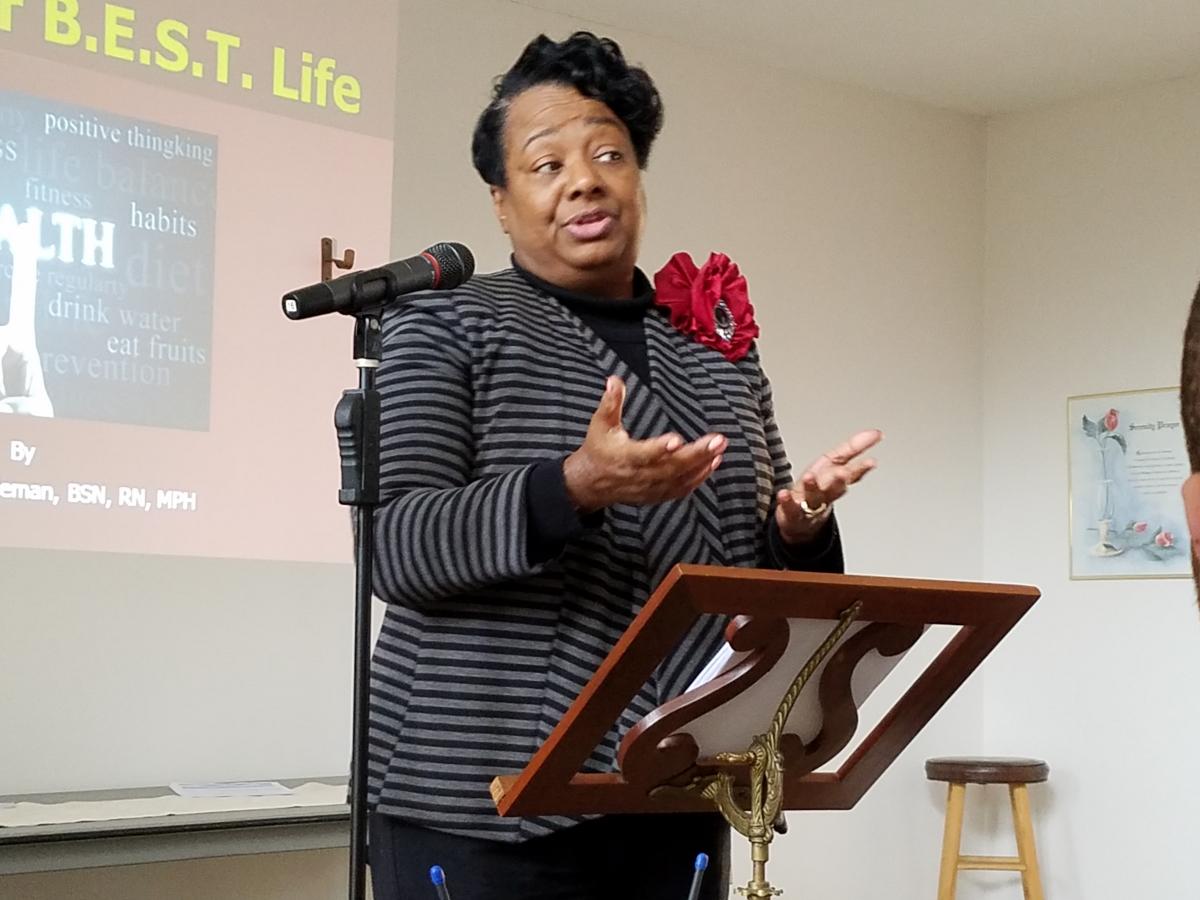Story by Jacquie Bokow
Women attending the Potomac Conference's Capital Memorial church's Women's Ministries Prayer Breakfast were recently challenged to live her "BEST" life at the church in Washington, D.C. Kathleen Coleman, Faith Community Health Network coordinator for Adventist HealthCare, spoke to the room full of women after a sumptuous catered vegetarian lunch. BEST stands for:
- Blessed of God,
- Essential Part of God’s Plan,
- Spiritually Led and Fed, and
- True to Yourself and to Your God.
Coleman (pictured below) shared that a review of the characteristics of the so-called “Blue Zones”—areas around the world that have a percentage of people living up to or longer than 100 ( Sardinia, Italy; Okinawa, Japan; Nicoya, Costa Rica; and Loma Linda, Calif.)—indicated the types of choices that led to such extended lifespans: strong family values, respected elders, a plant-based diet, exercise (like gardening and walking), laughter, a reason for w aking up in the morning, support groups, drinking hard water (which is high in calcium), stopping eating when 80 percent full, eating a light supper, maintaining a normal body weight, and Sabbath rest.
aking up in the morning, support groups, drinking hard water (which is high in calcium), stopping eating when 80 percent full, eating a light supper, maintaining a normal body weight, and Sabbath rest.
“What would we do without the Sabbath?” she asked, a question that elicited smiles and nods from the women there.
Coleman then asked each participant to write out what would constitute her own BEST Life, which the group shared among themselves.
Coleman then gave nine TIPS (Things I Perform to make me Stronger) in order to live their BEST lives:
- Choose three health goals to address. Coleman advised the women to “make your goals SMART: Specific, Measurable, Achievable, Realistic, Timely.” She also recommended writing the goals down. “You are 42 percent more likely to achieve your goal just by writing it down,” she said.
- Choose a personal motto or mantra and a Bible promise, such as “Ordinary or Extraordinary—The Choice is Yours” or “Never Give Up.” A Bible promise could be something like Proverbs 16:3: “Commit to the Lord whatever you do, and he will establish your plans.”
- List any challenges/barriers to achieving your goals and their possible solutions.
- Review your goals daily during your daily devotion, during which you will: (1) Pray your goals to success, and (2) Talk to God about your decisions and goals/motto and promise/barriers and solutions.
- Don’t let your past sabotage you. “Take a lesson from Paul,” she advised.
- Don’t stop and don’t give up.
- Where possible, surround yourself with many positive options so that, whatever you choose, it will be a good choice. This includes not just food choices but positive people. Coleman counseled the attendees to “Stay clear of toxic people.”
- Rehearse only positive thoughts, using affirmations and visualizations. For instance, think “I’m enjoying being 150 pounds” (or whatever your weight goal is). Visualize you’re already there.
- Celebrate success! Decide how you’ll celebrate reaching each health goal when you choose them in #1.
Each woman received a Personal Action Plan to write down her own first three goals, the deadline for each, and how she will celebrate when that goal is achieved. Once a woman achieved three goals, she was advised to begin the next three.
“Health starts in the mind,” concluded Coleman. “Choosing correctly is the foundation to good health. God never forces; it’s up to us to choose health. It’s never too late and never too early to make a change in your life.”

